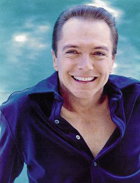
Entertainment Weekly
Old Kid on the Block
David Cassidy hits the comeback trail -- The former teen idol finds out whether anyone cares to hear from him
August 3, 1990
By David Browne
The face is a little weathered and the eyes are framed by crow's-feet. The hair, however, is eerily familiar — a shoulder-length brown shag, parted in the middle. It is the coif of a teen idol circa 1971, the only difference being that this is 1990 and the teen idol is now 40 years old, about to discover whether anyone cares to see his face or hear his voice again.
In the early '70s, David Cassidy was the original new kid on the block. Costarring with his stepmother, Shirley Jones, future L.A. Lawyer Susan Dey, and future recovering drug addict Danny Bonaduce, Cassidy was the androgynous Keith Partridge in the sitcom about an average suburban family that doubled as a rock band. Silly, yes, but The Partridge Family was an instant hit. Cassidy became a TV and recording star, with his mug gracing everything from teen magazines to coloring books. Girls longed for him; boys longed to lead a ''band'' of their own.
Then it was over. In 1974 the faltering series was canceled, and soon other teen idols took his place. New albums, a TV cop series, and Broadway roles came and went with scant public fanfare.
But deep inside, Cassidy felt he was ''robbed'' of his musical career; he had to rock. So, next month, he will release his first album in 14 years, simply titled David Cassidy. To alert the media, he is passing through New York during a midsummer heat wave, visiting radio stations, engaging in any and all photo opportunities, and drumming up interviews. The responses he receives are varied. Some of those he meets will see him and squeal; others will groan at the thought of yet another old pop star itching to be famous again.
On an artists' panel at the New Music Seminar, an annual industry gathering, Cassidy receives as many cheers as fellow panelists Flea (of the Red Hot Chili Peppers) and rapper Ice Cube. It is frighteningly exuberant applause — the sound of a generation facing a relic of its past and guffawing loudly. But is David Cassidy hip to the joke?
Apparently not. ''I feel very lucky,'' Cassidy says soberly. ''I feel very flattered by the fact that people are that interested in what's going on with me. I think they have seen that I have paid a lot of dues for being me. And they genuinely want me to win.'' In other words, he thinks they love him.
Back in his hotel room on this muggy afternoon, Cassidy doesn't feel like a winner. ''This is bad, really bad,'' he says, flipping through a script sent over from VH-1, where he will tape a video countdown later. Slouched in a chair, he is wearing a T-shirt and faded jeans with holes ripped in the knees and butt. There are no mobs outside, no ringing phones — just Cassidy, a table full of chicken-salad sandwiches, and a script that is not up to his standards. He starts reading his introduction in the exaggerated tones of a Veg-O- Matic salesman. ''Hi, I'm David Cassidy, and I know what you're thinking! But when you were listening to the Partridge Family, I was into Jimi Hendrix and Cream! Can you imagine what it was like to stand there and watch Danny Bonaduce playing bass?'' He grimaces at the thought of having to rewrite the script. ''The things you have to do to save yourself from looking like an asshole.''
He shoves a sandwich into his mouth and talks about the past. ''The last time I did a really big media blitz,'' he recalls of the early '70s, ''I was still the young kid and they were these hardened journalists who thought that the Beatles and Stones were the only guys that really counted. Huh.'' He laughs.
Cassidy, for one, has come to realize the merits of the Partridge clan. ''Artistically very frustrating, but, man, we made some great records, it was a very good television show, and I worked with some unbelievable people.'' Still, he adds, ''I was playing a part on television, and that became the David Cassidy story. But underneath, there was this guy who was dying to do 'Purple Haze.'''
Listeners won't necessarily hear that side of Cassidy on his new album; the record sounds more like Donny Osmond's comeback hit, ''Soldier of Love.'' But Cassidy says he snubs contemporary pop. ''It's this robotic urban thing that has very little humanness to it,'' he says. ''They're these technically great records that are kind of hollow. Know what I mean?''
Before he can reconquer the pop world, there are still a few obstacles to overcome. Back in the nearly empty lobby of his hotel, Cassidy is sitting on a marble staircase, waiting for a photographer to set up a shot. A few people walk by, but no one stops to gawk except a hotel porter, 29-year-old Henry Diaz. ''Keith! Keith!'' Diaz says to Cassidy. ''I'm gonna buy 10 copies of your album!''
Cassidy's publicist is not amused. ''His real name is David,'' he says.
''David Keith?'' asks Diaz, who is set straight and promised an 8-by-10 glossy. Like haircuts, some habits die hard.
A Cassidy Career Time Line
Sept. 1970:
The Partridge Family debuts on ABC; by December it is in the Nielsen ratings' top 10.
Oct. 1970:
The Partridges' first single, ''I Think I Love You,'' starts its climb to No. 1 on the pop charts.
Feb. 1971:
''Doesn't Somebody Want to Be Wanted'' is released; it reaches No. 6.
Nov. 1971:
Cassidy's only top 10 solo hit, a remake of the Association's ''Cherish,'' hits the charts.
May 1972:
He appears bare-chested on the cover of Rolling Stone. ''There'll be a time when this whole thing will be over,'' he says.
May 1974:
During a Cassidy concert in London, 14-year-old Bernadette Wheeler dies after suffering a heart attack during a crush to the stage. The following month, Cassidy announces he's taking a break from touring and recording.
Aug. 1974:
The Partridge Family, now at the bottom of the ratings, airs for the last time.
1975-6:
Cassidy records two albums for RCA with the help of Flo and Eddie, Bruce Johnston of the Beach Boys, and others.
Nov. 1978:
Cassidy returns to TV in the low-rated series David Cassidy: Man Undercover, which is canceled after two months.
May 1981:
The George M. Cohan musical Little Johnny Jones starts a West Coast run, with Cassidy in the lead. By the time the show reaches Broadway in 1982, Cassidy has been replaced by Donny Osmond.
March 1983:
Cassidy replaces Andy Gibb in the Broadway production of Joseph and the Amazing Technicolor Dreamcoat. The show lasts six more months in New York before going on the road with its star.
Nov. 1984:
Cassidy reportedly begins work on an album featuring songs by George Michael. Cassidy's advice to Michael: ''He told me never to do any series like The Partridge Family.'' The album is never released.
1987-8:
Cassidy replaces Cliff Richard in the London rock musical Time. Writes one reviewer: ''He looks cute and sings in tune, and little more is asked of him.''
